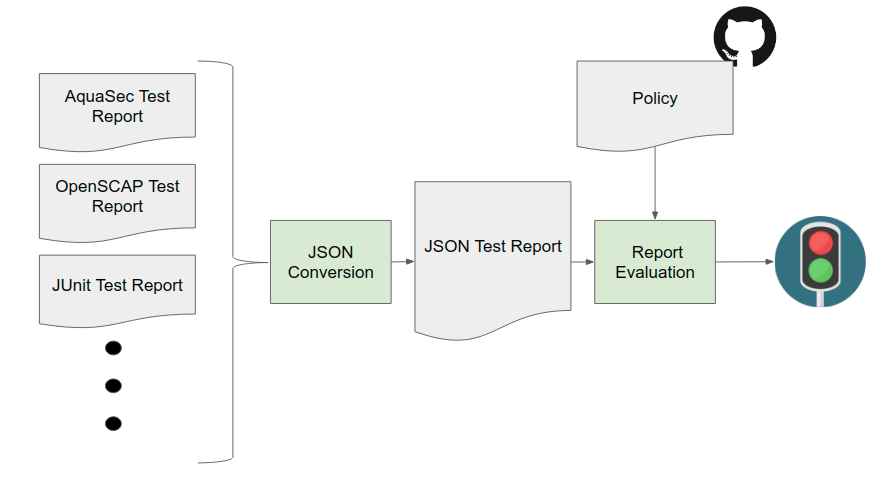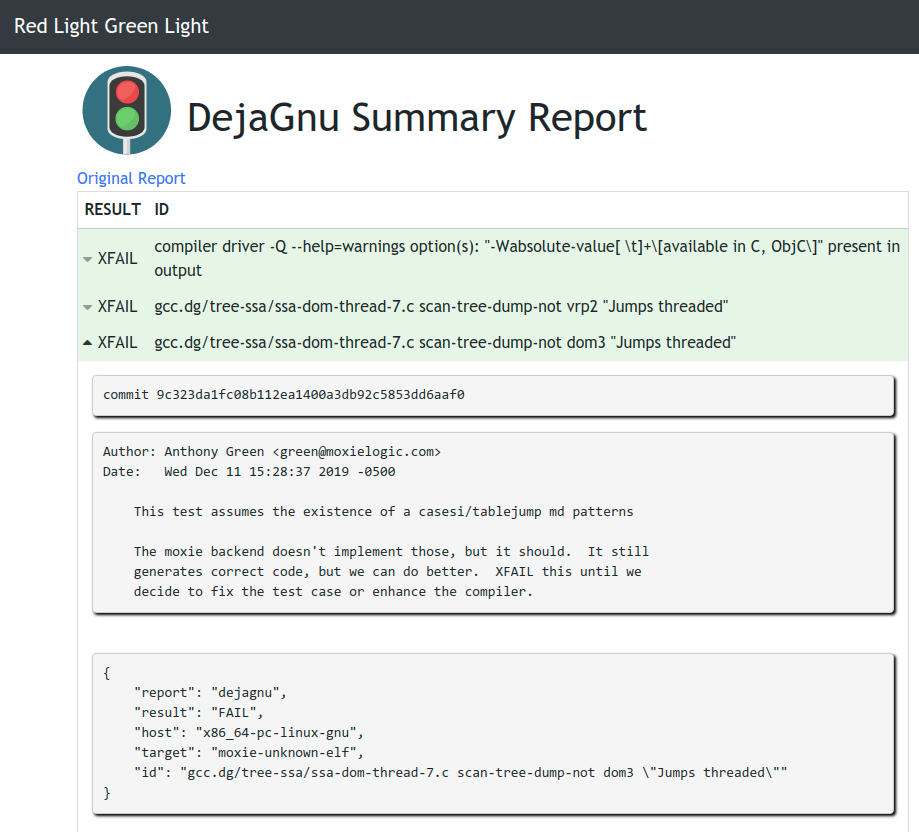Last year I hacked up a tool in frustration called Red Light Green Light (rlgl) -- a proof-of-concept effort to demonstrate a git-centric way to manage "quality gates" in a CI/CD pipeline.
A CI/CD quality gate is a process that evaluates the quality of a software artefact before allowing it to proceed to the next stage of the pipeline. For example, you may have a quality gate that examines the results of a container security scan report before pushing your container image into a registry.
It's probably worth reading the Red Light Green Light README before continuing here, but the basic idea is that we normalize test evaluation reports into JSON format, and them match those against JSON matching objects stored in a git repo to come up with either a Red Light or a Green Light. The resulting rlgl HTML report identifies how the PASS/FAIL/XFAIL patterns were matched along with links to the git commits for the matching policy. Here's a picture..

The benefits of this approach in a large regulated environment with segregated roles and duties are many:
- Evaluation policy is no longer locked within proprietary tools
- There's a well defined workflow for policy change management (pull requests)
- Authentication and authorization for policy management is a solved problem
- The policy change history is easily auditable
But as I was preparing a new release of libffi, another FOSS package I maintain, I realized that Red Light Green Light could easily be adapted to examine DejaGnu test results. This turned out to be a great idea.
We use travis-ci to test changes to libffi. This is critical because libffi is a complex and fragile peice of software -- a mix of C and assembly code that has been ported to almost 30 major processor architectures. Automated CI testing is important because I can't expect every contributor to test their changes on those 30 targets (combined with different compiler and OS ABIs, the test matrix explodes quickly).
I was recently looking at the moxie-elf GCC testresults (posted nightly to the gcc-testresults mailing list) and realized that, once again, Red Light Green Light could help me get a handle on the test failures. I was looking to solve three problems:
-
I needed a place to maintain state on test failures -- notes for myself that I can refer to when I have time to continue investigating. I work on moxie sporadically, often with many month gaps, so having the ability to annotate test failures with notes is important.
-
I needed a way to track regressions, so I can easily see when tests that were once passing start failing. This would be easy if every test was known to pass, but I am far from that.
-
I needed a way to track new failures for new test cases added by the GCC developers. Again, this would be easy if every test was known to pass, but not so easy if you have a collection of failures already.
Once again, this turned out to be a great idea. I've tracked down almost every test failure and recorded them in a policy repo at https://github.com/moxielogic/rlgl-toolchain-policy. I'm able to watch for regressions, new test failures and keep notes related to my debugging efforts. All of the good bits are in the policy's XFAIL file.
I run the test result evaluation after my nightly 'make check' run like so:
wget -qO - https://rl.gl/cli/rlgl-linux-amd64.tgz | \
tar --strip-components=2 -xvzf - ./rlgl/rlgl
./rlgl login https://rl.gl
export RLGL=$(./rlgl e --id=$(./rlgl start) --policy https://github.com/moxielogic/rlgl-toolchain-policy.git $(find . -name gcc.sum) || true)
At this point the RLGL environment variable contains the result of
the evaluation. Something like RED:
https://rl.gl/doc?id=RLGL-2FWVG23I, which I just paste into the
results that get posted to the mailing list.
Here's what a sample report looks like:

Feel free to try Red Light Green Light out. You can host it yourself, or use my experimental hosted version at https://rl.gl. All documents are reports are currently set to expire after 7 days.
As always, feedback welcome!